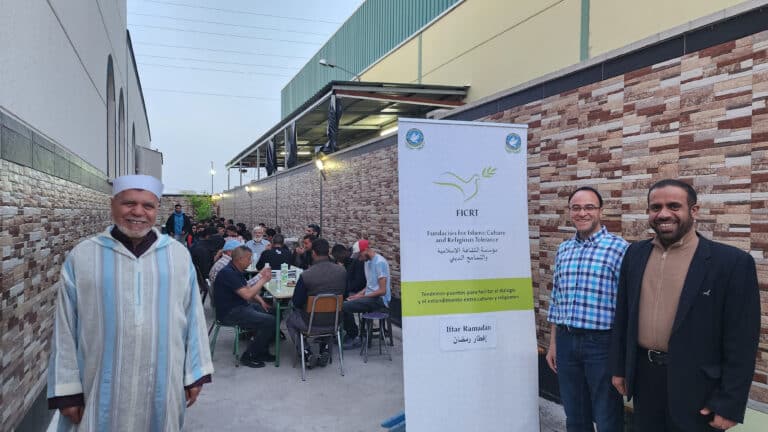“Fraternity is an ethical requirement for world peace and coexistence”. Jumaa Alkaabi, president of the IRCTF Board of Trustees, opened the international conference commemorating the International Day of Human Fraternity on February 4 with these words. This date marks the signing of a document in which the highest religious representatives, Pope Francis and Sheikh Ahmad al-Tayyib, Grand Imam of Al-Azhar, joined their efforts in the search for universal coexistence based on the culture of dialogue, common collaboration, and mutual knowledge. This day was a watershed moment in the unification of cultures, and it is critical that we explain the significance of this anniversary before we celebrate.
Human fraternity, according to Jumaa AlKaabi, “means respecting the right of others to live in freedom, dignity, and security”, and he recalled that fraternity is the universal link between people. According to him, fraternity brings brothers together in terms of sex, gender, privacy, dignity, and dependence. “Cultural diversity opens the door to understanding the other,” even in times of pandemic, when greater cooperation between cultures and religions is required.
Closeness, brotherhood, love, and peaceful coexistence bring about peace. He stated that the FICRT’s pillars are principles. “We are committed to implementing the Human Fraternity document’s principles and achieving its objectives by holding seminars and constructive interreligious dialogue discussions to spread the message of peace and knowledge of the other”, said the chairman of the Board of Trustees.
Following these words, the International Conference’s scientific coordinator and moderator spoke. Dr. Mohammed Dahiriintroduced the participants to various themes, including the figure of oneself, understanding and relationships with others, different religions, secularism, and technology.

It became clear at this meeting that history demonstrates that religions have considered all possible paths towards the search for the common good of civilizations, and that ancient texts value both freedom and human fraternity. From Christianity to secularism, from the parable of the Good Samaritan to the importance of the other, who seeks the interests of others as a global formation to which he belongs, even if he does not believe in God. “The world’s religions can help states’ diplomacy find out what is right and wrong, relating it to social justice,” said Dr. Nabil Ayad, professor of Diplomacy Studies at Glasgow Caledonian University’s London Campus. Religion serves as a link between the citizen and the state, allowing both to grow.
In this regard, Drs. Javier Fernández Vallinaprofessor of Hebrew and Aramaic Studies at the Complutense University of Madrid, and Juan Ferreiro GalgueraProfessor of State Ecclesiastical Law at the University of A Corua, emphasised that while there were historical periods when this fraternity was not advocated, civilization eventually achieved this coexistence. The French Revolution, for example, created the message of liberty, equality, and fraternity. According to Fernández Vallina, history has enabled religious values of today to have social transcendence. For Dr. Nabil Ayad, religion is “a vital part of the development of society”.
Fraternity is linked to liberty, which, in the words of the Dra. Miriam Díezdirector of the Ramon Llull University’s Blanquerna Observatory of Media, Religion, and Culture, “is given with common coexistence, patience, and care for the other, and which is forgotten when we fall into envy”.
Dr. Miriam Díez and Dr. Jaime Flaquer, directors of the Andalusian Chair for Religious Dialogue (CANDIR), emphasised this internal figure and the paths that each person finds:the first path is directed upwards, towards God, which meets the inner path that is directed towards the inside of oneself where God is also found; the last path is related to the sides, the direction that directs us towards respect for others, they explained.
Technology also had its place. According to the Dra. Miriam Díezis causing hypersensitivity in only one sense: sight, leaving aside the rest, and fraternity can help the rest of the senses to be equalised, through understanding and empathy with the equal, with the brother, with the other. Dr. Nabil Ayad, for his part, proposed using technology to create new approaches to dealing with threats to global society and minorities. Dr. Javier Fernández Vallina advocated for the use of the Internet for the social evolution of knowledge, with a focus on the development of both positive and negative interests.
Minority groups that use a biassed approach to religious texts to further their own interests and confuse the masses were also discussed. Dr. Jaime Flaquer exposed the main arguments and counterarguments used by these minorities to cause harm and hatred. Particularly since “every religion is a creator of fraternity in and of itself”. Religions do not incite to war or violence. The Dra. Miriam Díez emphasised that these incitements to conflict are motivated by extremist groups’ desire to achieve political and economic goals Dr. Nabil Ayad emphasised religion’s “spiritual values aimed at their obligation to care for one another”. The African tradition, the Muslim obligation of hospitality, and the Christian golden rule, among many other religious beliefs”.
Dr. Javier Fernández Vallina proposed academic, philosophical, and historical research on Abraham’s journey between cultures and religions, as well as secularism, for common knowledge and understanding.
The president of the FICRT Board of Trustees concluded the seminar by emphasising the importance of working together for human fraternity. Jumaa AlKaabi thus opened the Foundation’s doors to all those who want to help overcome the challenges to achieve human fraternity and peace for all.







